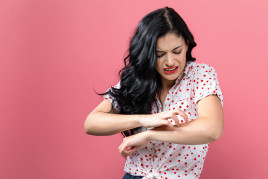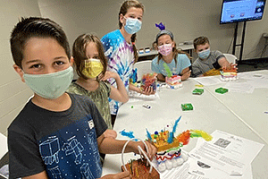Can blood pressure medication increase your skin cancer risk?
Link between blood pressure medication and risk of skin cancer
A few studies have found a link between taking some blood pressure medications and an increased risk of developing skin cancer.

News that taking blood pressure medication may increase your risk of developing skin cancer can be concerning if you’ve had skin cancer. Anyone who’s had skin cancer has a higher risk of developing another one. If you’re wondering whether to toss your blood pressure medication to reduce your risk, here’s what dermatologists recommend:
Continue taking your medication until you can talk with the doctor who prescribed it. Taking a blood pressure medication for a few more days or weeks won’t dramatically increase your risk of getting skin cancer. If you immediately stop taking the medication, your blood pressure may rise quickly. For some people, that rise could increase their risk of having a heart attack or stroke.
Tell the doctor who prescribed the medication about your concerns. Explaining why you’re concerned can help your doctor assess your risk. Be sure to tell your doctor that you’ve had skin cancer. Also tell your doctor if you:
Understand that only one type of blood pressure medication has been linked to an increased risk of developing skin cancer. In studies, only the blood pressure medications that contain hydrochlorothiazide have been linked to an increased risk of skin cancer. Researchers speculate this happens because hydrochlorothiazide makes the skin more sensitive to the sun.
Realize that more research is needed. The current findings came from Danish studies. The researchers reached their conclusion by looking at Danish medical records. Because the researchers discovered this by looking at medical records, they don’t know whether the patients had other risk factors for skin cancer. It could be that the patients who developed skin cancer never protected their skin from the sun. It’s possible they used tanning beds.
Follow these proven strategies to reduce your risk of getting another skin cancer. Science has shown us that it’s possible to reduce your risk of getting skin cancer by:
Keep your dermatology appointments. If you have a higher risk of getting skin cancer, you want to see a board-certified dermatologist. These doctors are the skin cancer specialists. Your dermatologist will tell you how often you should return for exams. Be sure to keep all of these appointments.
Controlling blood pressure good for your health, too
High blood pressure can harm your body. Controlling high blood pressure helps to prevent a stroke, heart attack, and kidney failure. By teaming up with your primary care doctor and a board-certified dermatologist, you can manage both your blood pressure and reduce your risk of getting another skin cancer.
If you need a dermatologist, go to: Find a dermatologist
Image
References
Pedersen SA, Gaist D, et al. “Hydrochlorothiazide use and risk of non-melanoma skin cancer: A nationwide case-control study from Denmark.” J Am Acad Dermatol. 2018; 78(4):673-81.
 Atopic dermatitis: More FDA-approved treatments
Atopic dermatitis: More FDA-approved treatments
 Biosimilars: 14 FAQs
Biosimilars: 14 FAQs
 How to trim your nails
How to trim your nails
 Relieve uncontrollably itchy skin
Relieve uncontrollably itchy skin
 Fade dark spots
Fade dark spots
 Untreatable razor bumps or acne?
Untreatable razor bumps or acne?
 Tattoo removal
Tattoo removal
 Scar treatment
Scar treatment
 Free materials to help raise skin cancer awareness
Free materials to help raise skin cancer awareness
 Dermatologist-approved lesson plans, activities you can use
Dermatologist-approved lesson plans, activities you can use
 Find a Dermatologist
Find a Dermatologist
 What is a dermatologist?
What is a dermatologist?